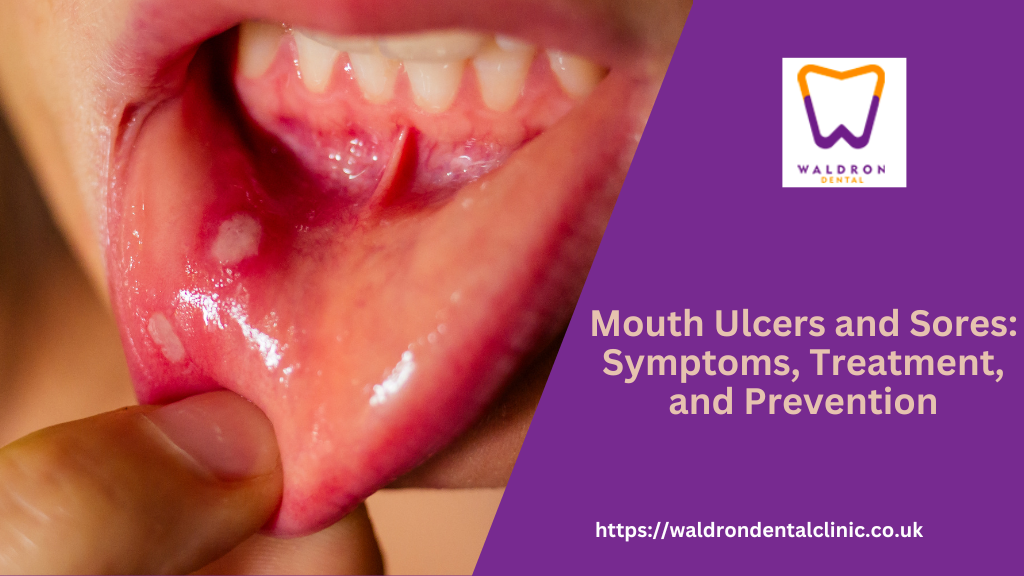If you’re experiencing pain and discomfort in your mouth when taking hot or cold drinks, you might be having a mouth ulcer. According to the NHS, mouth ulcers are painful sores that appear in the mouth. Oral ulcers are commonly occurring dental problems and are mostly harmless and self-healing. It has been estimated that oral ulcers affect over 25% of young adults.
While most oral ulcers heal by themselves, some experience recurrent ulcers. If you or a loved one is suffering from recurrent mouth ulcers and would like to know why they occur and what are their treatment options, this blog is for you. So, read on to learn everything you need to know about mouth ulcers.
What Causes Mouth Ulcers?
There are various causes of mouth ulcers. Typically, a single mouth ulcer can be due to damage caused by very hot food or drinks, or due to trauma on the cheeks, tongue, or lips due to a sharp tooth. Another reason for these so-called traumatic ulcers is a poorly fitting denture that puts pressure on the underlying soft tissues.
Oral ulcers can also occur due to hormonal imbalances. Some people also experience oral ulcers due to gastric issues and during stressful situations such as exams. The appearance of oral ulcers has also been linked to genetic factors in susceptible individuals.
Are Mouth Ulcers Caused By Stress?
Many people get oral ulcers when they are experiencing a stressful or emotional situation. This is because there is a link between stress or anxiety and oral ulceration. Research has shown that stress and anxiety are recognised as one of the most important risk factors for recurrent oral ulcers. One of the possible reasons for this is that people experiencing stress tend to bite their lips or cheeks more often, which can lead to oral ulcers.
What Is The Best Way To Treat A Painful Mouth Ulcer?
The treatment of mouth ulcers depends on their underlying cause. Most oral ulcers heal by themselves within 1 – 2 weeks without any scarring. However, some oral ulcers are either recurrent or tend to persist for a longer duration.
For example, if an ulcer is caused by a sharp edge of a tooth, your dentist will smooth out the edge or restore it with a dental filling to treat the issue. Similarly, if an ulcer is caused by an ill-fitting denture, your denture will make a new denture to relieve the symptoms.
Some of the treatment options for recurrent or persistent oral ulcers are:
- Drinking plenty of fluids
- Avoiding spicy, sour, and salty foods
- Ensuring optimal oral hygiene through regular brushing and flossing
- Using an alcohol-free medicated mouthwash twice daily
- Using an alcohol-free steroid-based ointment (prescribed by a dental practitioner)
In severe cases, dentists may prescribe immunosuppressant medication to treat recurrent or chronic mouth ulcers.
Can Mouth Ulcers Last For Months?
As mentioned earlier, most mouth ulcers heal on their own. However, some mouth ulcers can persist for a longer duration. If you or a loved one is experiencing an ulcer that has not healed for a few months, you should not take this condition lightly and seek advice from a dental practitioner without delay.
What Food And Drinks Cause Mouth Ulcers?
Mouth ulcers can be caused or aggravated by various foods and drinks. Some of them are:
- Acidic fruits and drinks
- Nuts
- Chocolates
- Spicy foods
- Coffee and alcohol
- Very hot foods and drinks can also cause mouth ulcers
- Hard foods may injure the oral soft tissues and cause ulceration
Can I Drink Alcohol With Mouth Ulcer?
Alcohol has been recognised as a risk factor for oral ulcers. Hence, it is best to avoid alcoholic or acidic beverages when experiencing ulcers to speed up healing.
How Do You Prevent Mouth Ulcers From Getting Worse?
Mouth ulcers can be prevented by taking care of the following:
- Ensuring optimal oral hygiene
- Eating a healthy, balanced diet with less spices
- Ensuring a healthy lifestyle to reduce stress and anxiety
My Mouth Ulcer Won’t Heal. What Should I Do?
If you’re experiencing an oral ulcer that hasn’t healed for a long time, you should consult your dentist immediately. Your dental practitioner will perform a detailed clinical examination to ascertain the underlying cause. They may also prescribe some laboratory tests to find the root cause. In some cases, they may also refer you to a medical doctor when your ulcers are linked to an underlying medical condition.
What Exactly Is A Canker Sore And Why Do They Hurt?
According to the American Academy of Oral Medicine, canker sores are rounded, small, yellowish sores that form on soft tissues in the mouth or at the base of gums. These ulcers, also called aphthous ulcers are the most common types of ulcers that develop in the mouth. Canker sores are painful and can be up to 1mm across. Aphthous ulcers are usually self-limiting but leave behind scars after healing.
Is Canker Sore Cancerous?
According to Healthline, canker sores or aphthous ulcers are not cancerous. These ulcers usually heal within 2 weeks. However, if any ulcer does not heal after a few weeks, one should consult their dentist immediately as some types of ulcers may indicate a developing cancerous condition.
If you are looking for an experienced dentist in Amersham for the treatment of recurrent or painful ulcers, Waldron Dental Clinic is your best option. We have the best dentists in town to take care of all your dental health needs. So, request an appointment today and let us take care of your entire family’s dental health.








